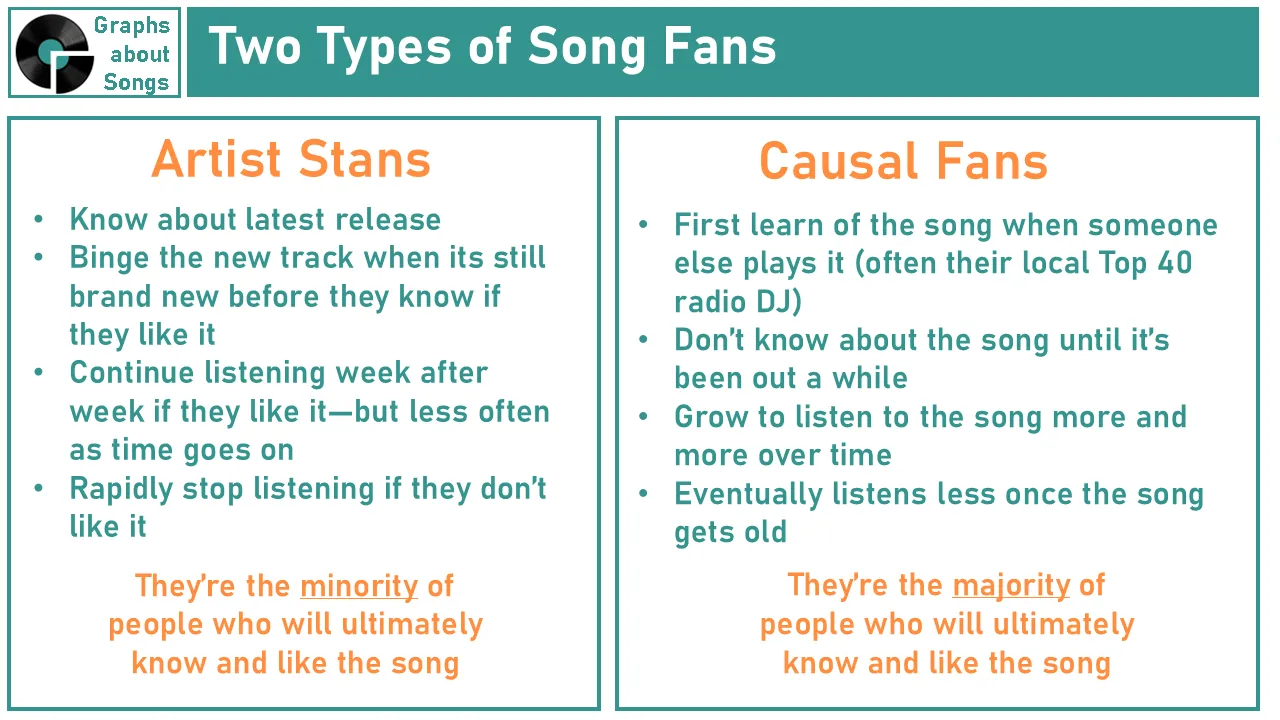|
|
Post by Rose "Payola" Nylund on Jul 13, 2025 21:28:37 GMT -5
I posted this link in the Hot 100 thread last week but it was right before JB announced his album so it kind of got lost in the shuffle. I think so much of what's mentioned in here is relevant to a lot of what gets talked about here on Pulse. Does The #1 Song Even Matter Anymore?: www.graphsaboutsongs.com/p/does-the-1-song-even-matter-anymoreMy favourite is the idea that hits are supported by two types of people: I don't love the label "artist stans" because 'stan' comes with certain implications, but it basically refers to fans of an artist who would listen to that artist's new music right away. So pretty much all of us fit into that group for our favourites. Casual fans are just that - people who like a song after hearing it casually on the radio or elsewhere and either growing to like it or they like it right away but the song has been out for awhile. Most of us fit into this group with artists we aren't already fans of. Here's the table from the website:  It goes on to explain how both groups consume music over time. Using Taylor Swift as an example, Swifties are going to listen to her new single/album a lot in the first week, but gradually less over time. While casual fans might eventually pick up on whatever the single is, but that happens later - if at all. Another suggestion made in here that I think is a great point worthy of discussion is that it's the casual fans who decide what a hit is. So, using Taylor again - she famously occupied the entire top 10 of the Hot 100, but those would have been a result of "artist stan" activity. Now, the article doesn't suggest that songs propelled by artist stans aren't hits, but they don't have the same level of cultural impact as songs with largely casual fan support. That really comes down to numbers anyway (both number of people and number of listens). Even for someone like Taylor Swift, if she has 10 million artist stans - people who will buy her album and stream her songs in week 1, that's still a lower number than casual fans, which we can presume to be a lot more people who don't listen to these songs as frequently. Anyway, I encourage anyone interested in charts and hits and cultural impacts to read that link above. It makes a lot of really interesting points. Also check out this one: Why it’s so hard to know what’s really a hit today www.graphsaboutsongs.com/p/why-its-so-hard-to-know-whats-really |
|
musicbuff
Gold Member
Joined: October 2024
Posts: 955
|
Post by musicbuff on Jul 24, 2025 15:24:54 GMT -5
I posted this link in the Hot 100 thread last week but it was right before JB announced his album so it kind of got lost in the shuffle. I think so much of what's mentioned in here is relevant to a lot of what gets talked about here on Pulse. Does The #1 Song Even Matter Anymore?: www.graphsaboutsongs.com/p/does-the-1-song-even-matter-anymoreMy favourite is the idea that hits are supported by two types of people: I don't love the label "artist stans" because 'stan' comes with certain implications, but it basically refers to fans of an artist who would listen to that artist's new music right away. So pretty much all of us fit into that group for our favourites. Casual fans are just that - people who like a song after hearing it casually on the radio or elsewhere and either growing to like it or they like it right away but the song has been out for awhile. Most of us fit into this group with artists we aren't already fans of. Here's the table from the website:  It goes on to explain how both groups consume music over time. Using Taylor Swift as an example, Swifties are going to listen to her new single/album a lot in the first week, but gradually less over time. While casual fans might eventually pick up on whatever the single is, but that happens later - if at all. Another suggestion made in here that I think is a great point worthy of discussion is that it's the casual fans who decide what a hit is. So, using Taylor again - she famously occupied the entire top 10 of the Hot 100, but those would have been a result of "artist stan" activity. Now, the article doesn't suggest that songs propelled by artist stans aren't hits, but they don't have the same level of cultural impact as songs with largely casual fan support. That really comes down to numbers anyway (both number of people and number of listens). Even for someone like Taylor Swift, if she has 10 million artist stans - people who will buy her album and stream her songs in week 1, that's still a lower number than casual fans, which we can presume to be a lot more people who don't listen to these songs as frequently. Anyway, I encourage anyone interested in charts and hits and cultural impacts to read that link above. It makes a lot of really interesting points. Also check out this one: Why it’s so hard to know what’s really a hit today www.graphsaboutsongs.com/p/why-its-so-hard-to-know-whats-reallyYes, lots of good points and observations here! So much has changed in the past 25 years! When the R&R message boards first started up, I think many of us tried to make sure that we were not an Artist Stan. The reason why is we didn't want to have the perception that we lost our objectivity. In other words, an Artist Stan had the tendency to love a song from a particular artist, no matter whether the song was good or bad, a hit or not. They loved the artist so much that they lost all objectivity and would love any song or album that particular artist released. Another thing that we would be wary about were the songs that we called, "fast rise, fast fall" songs. These were the songs that we felt were pushed up the charts because of the Artist Stans. They would skyrocket up the charts, and then suffer a major plunge soon after. We believed these types of songs were not really hits, and would not survive the test of time. It's very interesting to see how things have evolved during the Soundscan Era, the iTunes Era, and the Streaming Era. During the Soundscan Era, the record companies were thriving. After that, they were left on death's doorstep. Then, they were revived during the Streaming Era. I think most of the people here on Pulse Music would be more likely to be Casual Fans because we all love music. Our passion for music is insatiable. Some of us love many types of genres/formats. Others prefer 1 or 2 genres/formats. Once in a while, an Artist Stan does show up on our boards, but they generally don't stick around for long, or are not major posters/contributors. Having said that, I can tell you that every record company/record label knows the power of the Artist Stan. There was a really great article about this very topic. I will try and find the article and post it in this thread. In that article, they talked about the "Super Fan" vs. the "Regular Fan." I forgot the exact numbers provided, but it was something like 10% of an artist's fans are "Super Fans." But those Super Fans will buy 90% of the albums, the concert tickets, the merchandise for that artist. In other words, pretty much that artist's entire livelihood comes from only 10% of their fandom. So, the artists and the record labels know they need to super-serve the Super Fans. They will make or break the artist, not the Regular Fans that might listen to their songs from time to time on the radio or on streaming, but are unlikely to buy the albums, concert tickets, and merchandise. Which songs will stand the test of time? Who knows? Historically, people generally listened to the current hits throughout their childhood. Once they got to a certain age, they would stop listening to current music and they would prefer to listen to the songs that they liked when they were in high school and college. In fact, when I talk to people that are in their 40s, 50s, 60s, etc., they generally can't name any of the current hits of any genre/format. But, if I ask them about the music that was popular when they were in high school or college, they certainly can tell me about those songs. Gen Z appears to have changed all that. They are the first generation that is comfortable going back to songs from previous generations and making those songs go viral again. Prior to Gen Z, if you listened to the music your parents or grandparents listened to, you were considered "square" or "not cool." Kids nowadays are extremely knowledgeable about current music and older music from previous generations. Therefore, who knows what songs will stand the test of time, in the future? Time will tell! |
|
musicbuff
Gold Member
Joined: October 2024
Posts: 955
|
Post by musicbuff on Jul 25, 2025 15:04:10 GMT -5
Looks like the music industry is calling it "Superfan Monetization." There's actually been a lot of articles written about this topic. It seems like all the record execs know that the "Superfan" is the person they need to target. The numbers vary greatly from source to source, but the gist of it is a small group of people generate most of the revenue for the artists and record labels. It's also known as the "Pareto Principle" in Economics. Ex: 20% of your employees will do 80% of the work. In some circles, the Superfans might be known as "whales." These are the fans that are willing and able to throw down some serious cash for their favorite artist. The term "whale" is being used more and more to describe a Superfan. The term appears to have originated from video games. In the new realm of free video games online, players from anywhere in the world can play a video game for free. However, if they are willing to pay extra, they get rewarded with special perks and privileges that allow them to advance further in the game. It's a win-win, because those who have money to throw down, can enjoy the game on a whole new level. Those "whales" also need the players who are playing for free, because they need players to play along, so that they actually have players to beat! Otherwise, winning a game isn't as much fun. Anyway, here is one article about "Superfan Monetization." Superfans In Music: Shaping The Scene In 2024 |
|
musicbuff
Gold Member
Joined: October 2024
Posts: 955
|
Post by musicbuff on Jul 25, 2025 16:12:54 GMT -5
I think many of us have asked the question, "How come songs that we know are popular because they have gone viral on YouTube or other social media platforms, are not pushed to CHR/Pop radio or other radio formats?" I think the answer is clear now, the record labels think it's not worth it, to spend tons of money on marketing/promotions at traditional, perhaps outdated radio formats. Here is another article from Forbes, on the "Superfan Economy." From Passion To Commerce: Inside The Superfan Economy With Fave |
|
leonagwen
Diamond Member
#LiteralLegender
Joined: November 2011
Posts: 16,356
|
Post by leonagwen on Jul 29, 2025 14:37:33 GMT -5
There's probably 4 metrics to go by, Spotify, Apple Music, YouTube, and Radio airplay.
|
|




